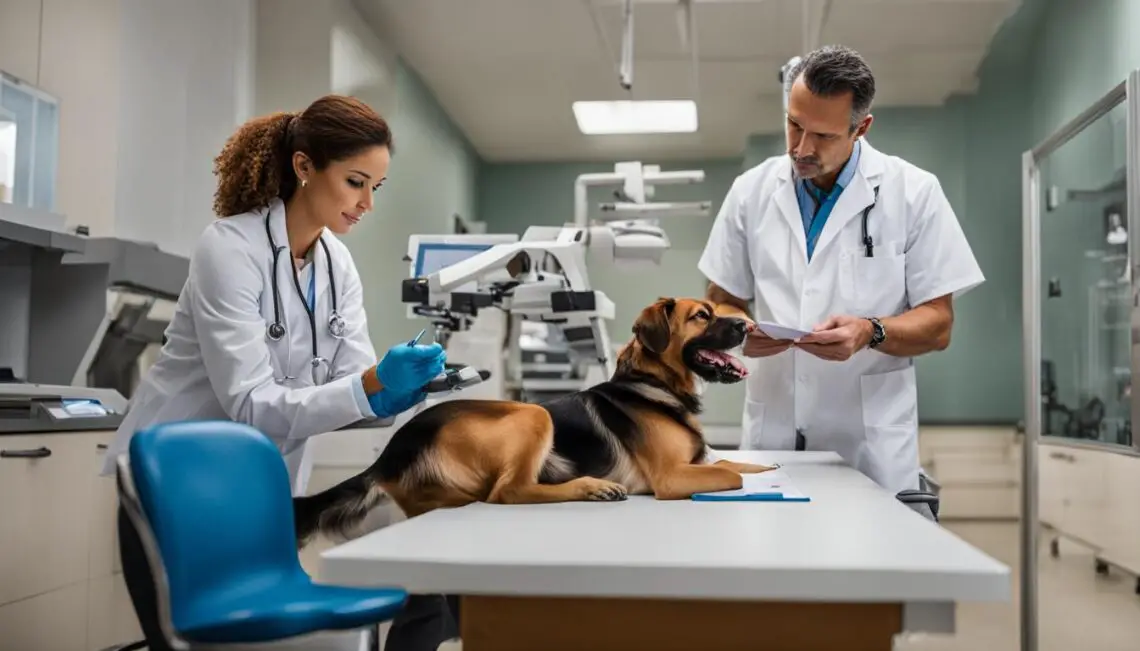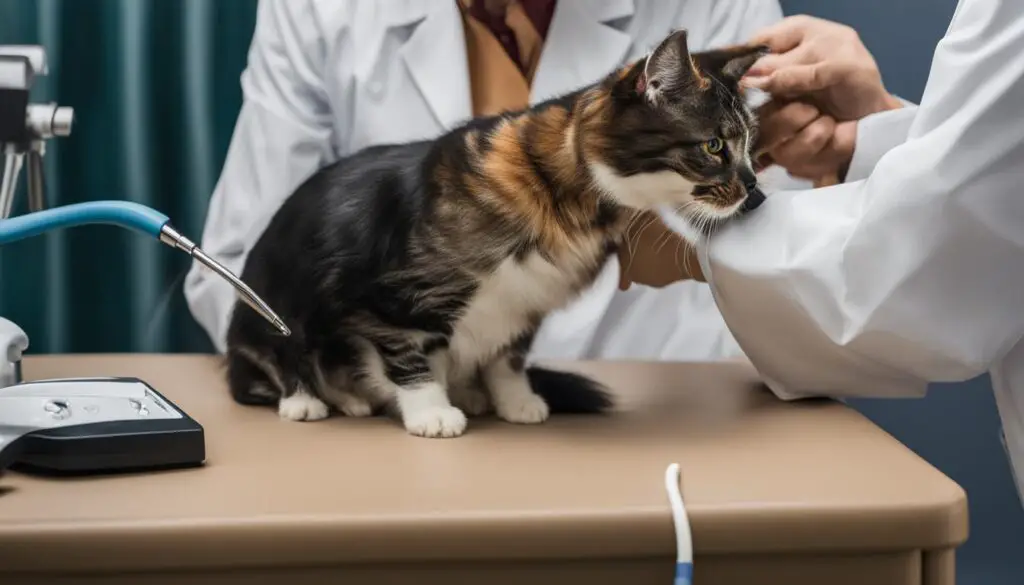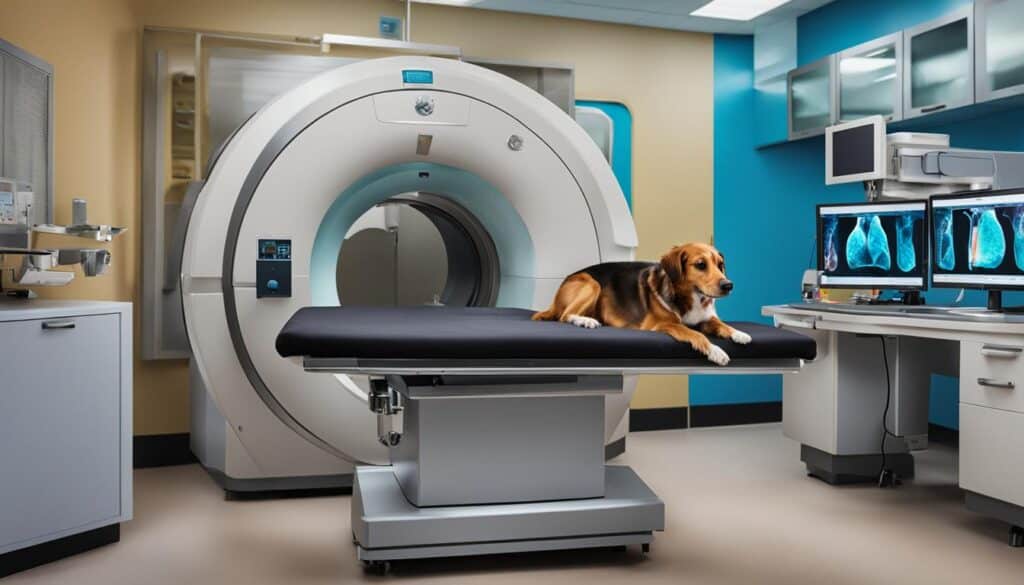As a responsible pet owner, I understand the importance of regular health check-ups for my furry companion. These check-ups not only ensure their physical well-being but also play a vital role in monitoring their behavior. Pets, just like humans, can experience changes in behavior that may indicate underlying health issues. By scheduling regular health check-ups, I can proactively address any concerns and provide the necessary care to keep my pet happy and healthy.
During these check-ups, veterinarians have the expertise to assess my pet’s behavior, identify any changes or abnormalities, and recommend appropriate treatment or management strategies. By monitoring behavior over time, they can detect early signs of illness and intervene before the condition worsens. Regular health check-ups also provide a comprehensive health history, helping veterinarians track the progress and effect of any prescribed treatments or behavioral interventions.
Key Takeaways:
- Regular health check-ups are essential for monitoring the behavior of pets and detecting any underlying health issues.
- Veterinarians can provide appropriate treatment or management strategies based on observed behavioral changes.
- Behavior monitoring during check-ups helps in the early detection of illnesses and prevents disease progression.
- Regular health check-ups contribute to a comprehensive health history for each pet, aiding in long-term care planning.
- By investing in regular health check-ups, pet owners prioritize their pet’s well-being and ensure early intervention when needed.
Understanding the Importance of Wellness Examinations
Wellness examinations, also known as check-ups or physical examinations, are routine medical examinations for dogs and cats that appear healthy. These exams focus on ensuring the overall health of the pet and are recommended at different frequencies based on the pet’s age and current health status.
During a wellness examination, veterinarians ask questions about the pet’s diet, exercise, behavior, and habits. This information helps them gain a comprehensive understanding of the pet’s lifestyle and any potential risk factors that might affect their health.
Once the initial assessment is complete, veterinarians perform a thorough physical examination to detect any underlying health issues. This examination includes evaluating the pet’s body condition, temperature, heart rate, and respiratory rate. Veterinarians also examine the pet’s eyes, ears, mouth, teeth, skin, coat, and overall body structure.
Based on this assessment, veterinarians recommend a range of preventive medicine treatments to maintain and improve the pet’s health. These treatments may include vaccinations to protect against contagious diseases, parasite control to prevent infestations, and nutrition recommendations tailored to the pet’s specific needs.
In addition to vaccinations and parasite control, wellness examinations may also involve discussions about joint health and dental care. Just like humans, pets can experience orthopedic issues and dental problems. Regular wellness examinations help identify these issues early on, allowing for timely treatment and intervention.
| Treatments | Frequency |
|---|---|
| Vaccinations | Yearly or as recommended by the veterinarian |
| Parasite Control | Yearly or as recommended by the veterinarian, depending on the geographic location and lifestyle of the pet |
| Nutrition | Ongoing, based on the pet’s age, breed, and any underlying health conditions |
| Joint Health | Ongoing, especially for senior pets or those with a predisposition to joint issues |
| Dental Care | Ongoing, regular dental exams and cleanings, as advised by the veterinarian |
Regular wellness examinations are paramount for ensuring the overall well-being of pets. They provide an opportunity to address any concerns or potential health issues before they escalate into something more serious.
Wellness examinations are not just about treating existing problems; they also focus on proactive preventive care. By maintaining a regular schedule of wellness examinations, pet owners can help their pets live healthier, happier lives.
By prioritizing wellness examinations, pet owners demonstrate their commitment to their pet’s health and happiness. These routine check-ups not only help in early detection of diseases but also provide an opportunity to discuss any behavioral changes, dietary concerns, or other issues that might be affecting the pet’s overall well-being.
Understanding the Aging Process in Pets
The aging process in pets differs from humans, and the popular belief that one calendar year equals seven dog years is a misconception. Puppies reach maturity quickly and are equivalent to teenagers or young adults by one year of age. The rate of aging slows down after the second year, and on average, dogs age 4-5 dog years per calendar year. Large breed dogs age more quickly than small breed dogs. By understanding the aging process, pet owners and veterinarians can determine the appropriate frequency of health check-ups based on breed, health status, and lifestyle.
Pet owners often wonder why their pets age differently than humans. While one calendar year typically consists of 365 days for humans, the aging process in pets is much faster. However, the notion that one calendar year equals seven dog years is inaccurate. In reality, the aging process in pets is more complex and varies based on different factors such as breed, size, and overall health.
During the first year of a dog’s life, they reach maturity quickly. By the time they turn one, puppies are equivalent to teenagers or young adults in terms of physical and sexual development. This rapid growth can be attributed to their shorter life expectancy compared to humans.
After the first year, the rate of aging slows down. On average, dogs age 4-5 dog years per calendar year. This means that a 2-year-old dog is roughly equivalent to a 10-year-old human. However, it’s important to note that the rate of aging can vary across different breeds. Large breed dogs tend to age more quickly than small breed dogs.
Understanding the aging process is crucial for pet owners and veterinarians to determine the appropriate frequency of health check-ups. Regular check-ups allow early detection of age-related health issues and provide opportunities for preventive care measures. It also enables veterinarians to tailor their approach based on a pet’s breed, health status, and lifestyle, ensuring their overall well-being and longevity.
As pet owners, it’s important to remember that the aging process in pets is unique and different from humans. By staying informed and working closely with veterinarians, we can provide the best care for our beloved furry companions and ensure they lead happy and healthy lives.
What to Expect During a Physical Examination
A physical examination is a vital component of your pet’s healthcare routine. It involves a thorough assessment of your pet’s overall well-being and helps veterinarians identify any abnormal signs or symptoms that may require further investigation or treatment. During a physical examination, several techniques are employed to gather important information about your pet’s health.
Observation plays a crucial role in assessing your pet’s general appearance. Veterinarians closely observe your pet’s gait, body condition, muscle condition, haircoat, skin, eyes, ears, nose, mouth, teeth, and overall demeanor. The visual cues gathered during this process can provide valuable insights into your pet’s overall health and potential underlying issues.
Auscultation is another essential aspect of a physical examination. Veterinarians listen to your pet’s chest using a stethoscope to evaluate their heart and lung sounds. This technique, known as auscultation, helps detect any irregularities or abnormal sounds that may indicate cardiovascular or respiratory problems.
Palpation is a technique that involves feeling specific areas of your pet’s body to gather information about their internal organs, muscles, lymph nodes, and other structures. Veterinarians use their hands to assess the size, shape, consistency, and tenderness of these areas, which can help identify abnormalities or signs of illness.
During a physical examination, veterinarians assess various parts of your pet’s body, including:
- Gait and body condition
- Muscle condition
- Haircoat and skin
- Eyes, ears, nose, and mouth
- Teeth and oral health
- Heart and lungs
- Pulse and lymph nodes
- Legs and musculoskeletal system
- Abdomen and internal organs
By conducting a thorough physical examination, veterinarians can identify potential health issues early on and develop an appropriate treatment plan. Regular physical examinations are essential for maintaining your pet’s well-being and ensuring a long and healthy life.
| Observation | Auscultation | Palpation |
|---|---|---|
| Assess general appearance, gait, body condition, haircoat, and more | Listen to heart and lung sounds using a stethoscope | Feel specific areas of the body to assess organ size, consistency, and tenderness |
| Provides insights into overall health and potential underlying issues | Detects irregularities or abnormal sounds in cardiovascular and respiratory systems | Identifies abnormalities, signs of illness, and potential health concerns |
Additional Tests and Wellness Screening
In addition to the physical examination, veterinarians recommend additional tests to assess the pet’s overall health. These tests are crucial in identifying underlying health issues and ensuring comprehensive wellness screening.
One of the tests commonly performed is fecal examinations. These examinations involve analyzing a small sample of the pet’s feces to check for the presence of parasite eggs. Parasite infestations, such as worms or giardia, can affect the pet’s digestive system and overall health. Early detection through fecal examinations allows for prompt treatment and reduces the risk of complications.
Wellness screening tests are also an important part of a comprehensive health evaluation. These tests provide valuable insights into the pet’s internal health and can help identify potential problems before they progress. Some of the wellness screening tests include:
- Complete blood count (CBC): This test evaluates the pet’s red and white blood cells, providing information about their immune system and overall health.
- Biochemistry profile: This test assesses organ function by measuring various substances in the blood, such as liver enzymes, kidney function, and electrolyte levels.
- Urinalysis: Through examining the pet’s urine, this test helps detect kidney problems, urinary tract infections, or other abnormalities.
- Thyroid hormone testing: This test measures the pet’s thyroid hormone levels, evaluating their metabolic function and identifying any thyroid-related issues.
Depending on the pet’s age, breed, and health status, additional tests such as diagnostic imaging may be recommended. Diagnostic imaging techniques, like X-rays or radiographs, are used to evaluate the internal organs or skeletal system for any abnormalities. They provide veterinarians with a visual representation of the pet’s internal structures, aiding in the diagnosis of various conditions or injuries.
By conducting these additional tests and wellness screening measures, veterinarians can gain a comprehensive understanding of the pet’s health and tailor their care accordingly. The information obtained from these tests helps veterinarians make informed decisions about the pet’s treatment plan and preventive measures.
| Additional Tests | Purpose |
|---|---|
| Fecal examinations | Checking for parasite eggs |
| Complete blood count (CBC) | Evaluating immune system and overall health |
| Biochemistry profile | Assessing organ function |
| Urinalysis | Detecting kidney problems and other abnormalities |
| Thyroid hormone testing | Evaluating metabolic function |
| Diagnostic imaging | Evaluating internal organs or skeletal system for abnormalities |
Benefits of Early Detection and Treatment
Early detection and treatment of diseases in pets can significantly improve outcomes and prevent irreversible damage. Regular health check-ups allow veterinarians to detect signs of illness before noticeable symptoms occur and initiate appropriate treatment. By addressing health issues early, pet owners can manage or correct problems to improve their pet’s quality of life. Early detection and treatment are often less costly and less invasive than waiting for a disease or condition to advance.
During routine health check-ups, veterinarians thoroughly assess the pet’s overall health, including physical examination, observation, and diagnostic tests. Through these evaluations, they can identify potential health concerns and develop a tailored treatment plan to address them promptly.
Preventing Disease Progression
Early detection enables veterinarians to intervene in the disease progression and prevent further complications. By identifying health issues at an early stage, veterinarians can implement treatment options that effectively manage the disease and slow down its progression. This proactive approach not only improves the chances of a positive outcome but also reduces the potential for long-term complications or chronic conditions.
For example, with early detection, common diseases such as diabetes, kidney disease, or cancer can be identified and treated promptly, allowing for a better prognosis and improved quality of life for the pet.
Treatment Options
Another benefit of early detection is the availability of a wider range of treatment options. When health issues are detected and addressed early on, veterinarians have more treatment options to choose from, including less invasive procedures and medications that may be more effective in managing the condition.
Additionally, early detection may allow pet owners to explore alternative therapies or interventions that can complement traditional medical treatments. These options may include dietary changes, physical therapy, or behavioral modifications, all of which can contribute to the pet’s overall well-being and recovery.
By emphasizing the importance of early detection, regular health check-ups can ultimately lead to healthier and happier pets. Pet owners can rest assured knowing that they are actively involved in their pet’s well-being and are taking preventative measures to ensure their pet’s health and longevity.
The Importance of Regular Vet Check-ups for Behavior and Mental Health
Regular vet check-ups play a crucial role in maintaining the behavior and mental health of pets. As a responsible pet owner, it’s essential to prioritize preventive care to ensure your furry companion lives a happy and fulfilling life. Here, we’ll explore the key aspects that make regular vet check-ups vital for your pet’s well-being.
Preventive Care
Preventive care measures are an integral part of regular vet check-ups. These measures include vaccinations, flea and tick control, and deworming treatments. By keeping up with these preventive measures, you can protect your pet from diseases and parasites, ensuring their overall health and well-being.
Tailored Nutrition
Nutrition plays a vital role in maintaining your pet’s physical and mental health. During a regular vet check-up, your veterinarian will assess your pet’s nutritional needs and provide tailored nutrition advice. They will help you choose the right diet based on your pet’s age, breed, size, and any specific dietary requirements or health conditions they may have. A balanced and appropriate diet can helpsupport your pet’s overall well-being and prevent health issues in the long run.
Dental Care
Dental care is often overlooked but is an essential aspect of your pet’s overall health. During a vet check-up, your veterinarian will examine your pet’s teeth and gums, looking for signs of dental disease, tartar buildup, or other oral health issues. Regular dental care, including professional cleanings and daily brushing, can help prevent dental disease, promote fresh breath, and contribute to your pet’s overall well-being.
Behavior Issues
Behavioral issues can be a sign of underlying medical conditions or changes in the household environment. During regular vet check-ups, veterinarians can address any behavioral issues your pet may be experiencing. By understanding the root cause of these issues, such as pain, anxiety, or illness, your veterinarian can recommend appropriate treatments or behavior modification strategies. Addressing behavioral issues is crucial for maintaining your pet’s mental health and ensuring a harmonious relationship between you and your furry friend.
Regular vet check-ups are not just about managing diseases or treating illnesses; they are about holistic care and promoting your pet’s overall well-being. By prioritizing preventive care, tailored nutrition, dental care, and addressing behavior issues, you give your pet the best chance at a happy and healthy life.
Conclusion
Responsible pet ownership goes beyond providing food and shelter. It also entails taking proactive measures to ensure the health and well-being of our beloved companions. Regular health check-ups are a crucial aspect of responsible pet ownership, as they allow us to stay on top of our pets’ health and provide them with the care they need.
Investing in regular health check-ups not only helps us detect potential health issues early on but also enables us to implement preventive care measures. Through these check-ups, veterinarians can provide tailored nutrition advice, perform dental examinations, and address any behavior management concerns. By staying proactive and addressing these aspects of our pets’ health, we can ensure their optimal health and longevity.
Regular health check-ups serve as an investment in our pets’ health. By being vigilant in scheduling and attending these check-ups, we demonstrate our commitment to our pets’ well-being. The benefits of regular health check-ups far outweigh the costs, both in terms of finances and time. They give us peace of mind, knowing that we are doing everything we can to provide the best possible care for our furry companions.
So, if you haven’t already, schedule an appointment with a veterinarian today and give your pet the gift of regular health check-ups. By doing so, you are not only fulfilling your responsibilities as a pet owner but also ensuring that your pet thrives in a healthy and happy environment.
FAQ
Why are regular health check-ups important for pets?
Regular health check-ups are essential for monitoring the behavior of pets to ensure their optimal well-being and health. These check-ups help detect any underlying health issues, manage disease progression, and provide preventive care measures. They also allow veterinarians to monitor changes in behavior over time, providing a comprehensive health history for each pet.
What are wellness examinations?
Wellness examinations, also known as check-ups or physical examinations, are routine medical examinations for dogs and cats that appear healthy. These exams focus on ensuring the overall health of the pet and are recommended at different frequencies based on the pet’s age and current health status. During a wellness examination, veterinarians ask questions about the pet’s diet, exercise, behavior, habits, and perform a physical examination. Based on this assessment, veterinarians recommend preventive medicine treatments such as vaccinations, parasite control, nutrition, joint health, and dental care.
How does the aging process in pets differ from humans?
The aging process in pets differs from humans, and the popular belief that one calendar year equals seven dog years is a misconception. Puppies reach maturity quickly and are equivalent to teenagers or young adults by one year of age. The rate of aging slows down after the second year, and on average, dogs age 4-5 dog years per calendar year. Large breed dogs age more quickly than small breed dogs. By understanding the aging process, pet owners and veterinarians can determine the appropriate frequency of health check-ups based on breed, health status, and lifestyle.
What is involved in a physical examination for pets?
A physical examination involves observing the pet’s general appearance, listening to their chest with a stethoscope (auscultation), and feeling specific areas of the body (palpation). During a physical examination, veterinarians assess the pet’s gait, body condition, muscle condition, haircoat, skin, eyes, ears, nose, mouth, teeth, heart, lungs, pulse, lymph nodes, legs, and abdomen. These examinations help identify any abnormalities or signs of illness that may require further investigation or treatment.
Are additional tests recommended during pet health check-ups?
In addition to the physical examination, veterinarians recommend additional tests to assess the pet’s overall health. These tests include fecal examinations to check for parasite eggs, wellness screening tests such as complete blood count, biochemistry profile, urinalysis, and thyroid hormone testing. Depending on the pet’s age and health status, additional tests such as X-rays or radiographs may be recommended to evaluate the internal organs or skeletal system for any abnormalities.
Why is early detection and treatment important in pets?
Early detection and treatment of diseases in pets can significantly improve outcomes and prevent irreversible damage. Regular health check-ups allow veterinarians to detect signs of illness before noticeable symptoms occur and initiate appropriate treatment. By addressing health issues early, pet owners can manage or correct problems to improve their pet’s quality of life. Early detection and treatment are often less costly and less invasive than waiting for a disease or condition to advance.
How do regular vet check-ups contribute to the behavior and mental health of pets?
Regular vet check-ups play a crucial role in maintaining the behavior and mental health of pets. Veterinarians provide preventive care measures, tailored nutrition advice, and dental examinations to ensure pets receive proper care. They also address behavioral issues that may stem from medical conditions or changes in the household. By monitoring behavior and addressing mental health concerns, veterinarians contribute to the overall happiness and well-being of pets.
Are regular health check-ups necessary for responsible pet ownership?
Regular health check-ups are not just a recommendation but an essential part of responsible pet ownership. They allow for early detection of health issues, preventive care measures, tailored nutrition advice, dental care, behavior management, and long-term health monitoring. By investing in regular health check-ups, pet owners can ensure the optimal well-being, health, and longevity of their furry companions. Schedule an appointment with a veterinarian today and give your pet the gift of regular health check-ups.







No Comments